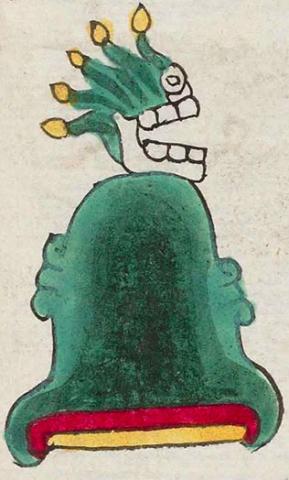Malinaltepec (Mdz41r)
This compound glyph for the place name Malinaltepec, has three principal elements: a skull (not a phonetic part of the name) with tall grasses (malinalli) for hair, and this sits atop a hill or mountain (tepetl). The locative suffix (-c) (as given in the gloss) is not shown visually, but it combines with -tepe- to form -tepec, a visual locative suffix meaning "on the hill" or "on the mountain."
Stephanie Wood
The skull points to death, and this may be explained because, as shown in our online Nahuatl Dictionary, nopalli malinalli is a diphrasis that stands for blood (owing to the tuna fruit's red juices) and death, the latter being especially associated with the herbs. Perhaps the malinalli grasses had the potential to heal, preventing death, or to kill, because the dried malinalli grasses have been said to serve as curative herbs, and they have an association with "the moon, drunkenness, the theluric goddess Cihuacóatl Quilaztli, who is undoubtedly one aspect of witchcraft." [See: Michel Graulich, "Las brujas de las peregrinaciones aztecas," Estudios de Cultural Náhuatl 22 (1992), 87–98, and for this example, see 91.] While not twisted here, the grass in this glyph has yellow flowers at the tips, much the same as the small yellow flowers in the other rendition of a compound glyph for Malinaltepec on folio 13 recto. Malinalli is also a day sign in the calendar. Karttunen and Berdan both take malinalli here as referring to the grass on the hill, rather than the calendrical name (which does seem to play a role in the place name Malinalco).
Stephanie Wood
malinaltepec. puo
Malinaltepec, pueblo
Stephanie Wood
c. 1541, but by 1553 at the latest
Stephanie Wood
One could say that the skull and grasses combine into one element, but they are being counted here separately.
mountains, hills, montañas, cerros, grasses, medicinal herbs, hierbas, nombres de lugares

malinal(li), long grass or twisted grass, https://nahuatl.wired-humanities.org/content/malinalli
tepe(tl), hill or mountain, https://nahuatl.wired-humanities.org/content/tepetl
-tepec, on the hill or mountain, https://nahuatl.wired-humanities.org/content/tepec
"On the Hill of Grass" (apparently agreeing with Berdan and Anawalt) [Frances Karttunen, unpublished manuscript, used here with her permission.]
"On the Hill of Grass" (Berdan and Anwalt, vol. 1, p. )
"En el cerro de las hierbas 'malinalli'"
Stephanie Wood
Codex Mendoza, folio 41 recto, https://digital.bodleian.ox.ac.uk/objects/2fea788e-2aa2-4f08-b6d9-648c00..., image 92 of 188.
The Bodleian Libraries, University of Oxford, hold the original manuscript, the MS. Arch. Selden. A. 1. This image is published here under the UK Creative Commons, “Attribution-NonCommercial-ShareAlike 3.0 License” (CC-BY-NC-SA 3.0).


